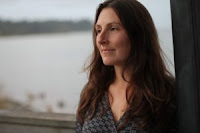Published 2004 by Counterpoint
246 pages
Publisher's Summary:
Left alone with her sad, peculiar father, Nomi Nickel's days are spent piecing together why her mother and sister have disappeared and contemplating her inevitable career at Happy Family Farms, a chicken slaughterhouse on the outskirts of East Village, a town founded by Mennonites on the cold, flat plains of Manitoba, Canada. This darkly funny novel is the world according to Nomi, a bewildered and wry sixteen-year-old trapped in a town governed by fundamentalist religion and in the shattered remains of a family it destroyed. In Nomi's droll, refreshing voice, we're told the story of an eccentric, loving family that falls apart as each member lands on a collision course with the only community any of them have ever known.
My Thoughts:
When I put together the list of books for my book club to read this year, one of my tasks was to choose a book written by a Canadian author. I chose one, read it, and decided it was too dark. And then I looked and looked for a book by a Canadian author that was set in Canada and not too dark. Having enjoyed Toews' Women Talking and The Flying Troutmans, I picked this book. Which is, if not dark, bleak. Although it is loaded with dark humor.
In a small, restrictive town, it should be no surprise that things happen slowly in this book with hardly a ripple in the pool that is life in East Village. A daughter leaves home. A mother is excommunicated and leaves town. A father, unable to deal with the loss of the love of his life, slowly comes apart. A young teen, adrift with no one to really care about her well-being, begins to fail in school and stay out nights doing more and more drugs.
A lot of reviews of this book compare it to The Catcher In The Rye, a book I've never read. But I'm given the impression that Holden Caulfield, angsty teen, has not particular reason for being disaffected. Nomi, on the other hand, has had her life turned upside down. Growing up concerned that one or the other of her family members might be headed for eternal damnation, Nomi was happy. She admired her sister and loved her parents even though she knew how deeply unhappy her sister, Tash, was in East Village and how mixed-up thing seemed to be. After Tash and their mother leave, Nomi gradually begins to see how constricted her life will be if she stays in East Village and how trapped she has become. Tash has taught her "that some people can leave and some can't and those who can will always be infinitely cooler than those who can't and I'm one of the ones who can't because you're one of the ones who did and there's this old guy in a wool suit sitting in an empty house who has no one but me now thank you very, very, very much."
Religion rules the village and Nomi's life. It's a complicated thing - real life is nothing like the life American tourists come to the village to see. It's so different that the villagers have set up a separate part of town where the tourists can see villagers acting out the way life used to be. But the young people in East Village behave very much like teenagers every where, especially those who feel trapped in a small town with no good prospects. Which makes me wonder about the Mennonites I see here sometimes. Are they really who they appear to be in when they are in public?
The days seem to drag on, every day much the same as the other - walking around town, driving around town, sitting in his truck with her boyfriend, visiting her friend Lydia in the hospital, getting kicked out of school again and again for being mouthy to the teachers, and trying to help her father stay afloat. In many ways, as I was reading, it felt like we were treading water and it was work to keep going.
In doing some research to put together discussion questions for my book club, the question of what the title means kept coming up and, as with so many books, there were a lot of different theories. Not until just this moment did I finally come up with my own opinion about what the title means. But I'm sorry to say that I can't tell you what that theory is because it has to do with the end of the book, an ending I can't say I thought much of until this theory occurred to me. And now I'm left wondering if that complicated kindness with have been worth what it cost.














